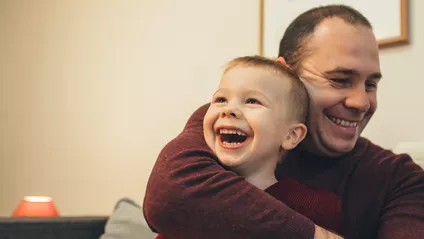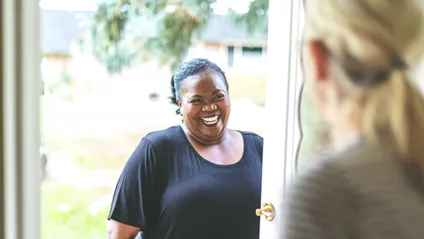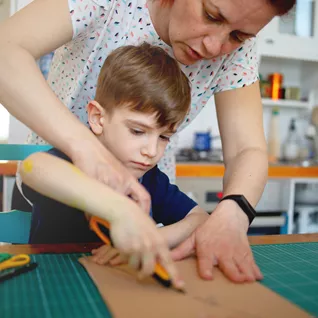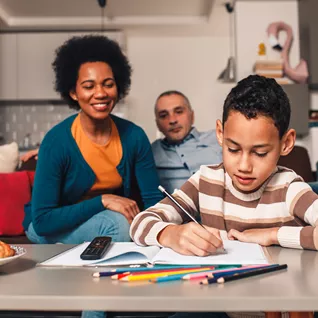Becoming a foster parent
Fostering a child is one of the most rewarding things you can do. Foster carers help to change a vulnerable child’s life by providing a loving and nurturing home to them – and the difference you can make is truly incredible.
With over 25 years experience, Fosterplus provide a full network of support to foster parents, and expertly match children with the right families to ensure the very best fostering experience for all. We’ve developed and sustained an outstanding reputation for quality, giving children the consistency and stability they need to grow.
All our offices are rated ‘Outstanding’ or ‘Good’ by Ofsted and The Care Inspectorate, demonstrating the high standards of care we provide. If you’d enjoy working with a professional, highly skilled but friendly and supportive team, then find out more about how to foster a child with Fosterplus.
To become a foster carer, you just need to complete our online enquiry form (or call us on 0800 369 8512). It’s quick and easy to do, and just lets us know you’re interested. Once we’ve received it, we’ll give you a quick call for a short informal chat – just to say hello, introduce ourselves, ask you a few questions and answer any of yours. There’s no pressure and no obligation for you to take things further. But if you want to, we’ll help you start your journey.
How to become a foster carer

1. Get in touch
The first step is often the hardest – once you’ve completed our online web form, we’ll give you a call to speak about the work we do, take some basic details and answer any questions.

2. Home visit
When you’re ready to start your application, one of our team will visit you at home (or via video call) to talk to you about the role in more detail and find out more about you and your desire to foster.

3. Apply to foster
After your visit, you’ll need to complete an application form to be considered. Our assessment manager will review this and if successful, you’ll start your fostering assessment.

4. Assessment
The fostering assessment takes around 4-6 months to complete and includes a series of social work visits, background checks, personal and professional references, and some initial training too.

5. Fostering panel
The final step in the fostering process is where an independent panel of child care professionals and care leavers review your assessment and make a recommendation on your approval.

6. Finding the right match
Expertly matching our foster parents to children is a specialism we’ve honed over many years, and we take extra care in this part of the process to ensure an enjoyable fostering experience for all.
How long does it take to become a foster parent?
On average, becoming a foster carer takes four to six months. There’s a standard assessment process for all foster parents in the UK, and it’s generally the same for every fostering organisation.
The assessment process might seem quite long but it’s a detailed process, designed to give everyone room and space to think things through properly. Our team are there to support you with every step of your journey.
The different types of fostering
Frequently asked questions
How long does fostering process take?
Applying to become a foster parent generally takes between 4-6 months. The process involves an application, a full fostering assessment (also known as a ‘Form F Assessment’), including background checks, references and social work visits, and finally panel.
Can I foster a child?
Probably something you’re wondering…
Well, the truth is, almost anybody can apply to foster a child or young person. The initial fostering requirements in the UK are that you must be over 21 years old, have a spare bedroom that’s always available to a foster child, and have the legal right to live and work in the UK. Of course, having the passion, commitment and resilience to make a difference in a child’s life are also important.
If you meet the initial criteria, then we’d welcome your application to foster. Our fostering application process looks at you as an individual and is designed to make sure that you’re right for fostering, and that fostering is right for you.
Does a foster child need their own bedroom?
Yes, every foster child will need a bedroom of their own. This provides them with a calming space to escape to when they feel overwhelmed and gives you and your family some much-needed privacy. There may be some occasions where a local authority will allow siblings under a certain age to share a bedroom if it means they’re able to stay with the same foster family.
Can I foster and work full time?
There’s no simple answer to whether you can continue to work full-time and foster as it completely depends on your personal circumstances.
As the main foster parent, there are various meetings that you’ll need to attend which generally take place during the day, including ongoing training, regular supervision with your social worker and meetings with other care professionals. If your current job wouldn’t get in the way of you attending these important meetings, for example, you’re self-employed or have a flexible employer, and you’re sharing the fostering role with a partner, then it could be possible.
If this doesn’t sound like your situation, then we might ask you to consider reducing your working hours, so a child in your care receives the time and support they need from you as their foster parent. But it’s always worth speaking to one of our fostering advisors as every situation is different and we’d be able to better advise you over a quick chat.
Also, remember that fostering is a paid and professional role, so you’ll receive a generous allowance to cover the costs of caring for a child, alongside a fee for your hard work, knowledge, experience, and commitment to children in care.
How much money do foster parents get?
With Fosterplus, you’ll receive a generous fostering allowance for each child in your care, plus other benefits too. The fostering allowance varies depending on where you live, the age and needs of the child in your care, and your experience.
What is foster care?
A child may come into foster care when they’re not being cared for to a good enough standard at home. This could be for a number of reasons, but the most common are due to neglect or abuse. A foster family provides a child with a stable, loving family environment where they can stay for as long as needed – sometimes this is a couple of days, weeks or months, other times it’s for many years until they turn eighteen.
What is a foster carer's role?
Foster parents provide vulnerable children and young people with a safe and stable place to stay when they’re not able to live with their birth family. As well as performing typical parental duties, foster parents attend regular training and meetings with other care professionals, facilitate positive contact with birth parents and siblings, and provide emotional support to help children heal from difficult past experiences, along with many other things.
Although foster parents are responsible for caring for a child or young person, legal responsibility remains with the local authority and birth parents, and therefore permissions will need to be sought for things like haircuts and holidays abroad.
How long do foster parents keep a child?
The length of time that you provide foster care to a child depends on the child and the type of foster placement they need. This could be anything from a night or two in an emergency, up to 2 years for short-term fostering, or a number of years until a child turns eighteen if they’re in long-term foster care.
When you’re in the process of becoming a foster parent, we’ll discuss all the different types of foster care with you, so you can explore what might suit you and your family. This won’t be set in stone either, so if you initially feel that short-term fostering is better suited then later decide to care for children on a long-term basis, that’s absolutely possible.
Can you pick the age of a foster child?
The short answer is ‘yes’. Before you’re even approved as a foster carer, we’ll have an in-depth understanding of your preferences around the types of children you feel might be most suited to you and your family. This includes age range.
Having said that, we always advise our foster families to stay open-minded around age and try to focus on the detail within the referral about the child, rather than simply the age. Neglect and other negative childhood experiences can mean that children and young people present much younger than their biological age. It’s also perfectly normal for your preferences to change over your fostering career as you gain confidence or your family circumstances change.
What age child should I foster?
There are lots of things that you’ll need to consider when looking to become a foster parent. One of them is the age of the children you’d like to care for. In our experience, this is completely individual to you and your family and something you’d need to discuss with your fostering service provider. If you’re applying to foster with us, then your assessing social worker will speak to you about this.
However, there are some things to know:
Teenagers
For whatever reason, fostering teenagers is often perceived to be the most challenging. However, this isn’t always the case and from our experience, caring for teenagers can be hugely rewarding. They’re reaching an important stage in their development and you get the chance to be a positive role model and guide them down the right path. We also find they’re often more independent, which can be beneficial if you’re considering working while fostering. We’ve also seen some truly wonderful bonds formed between teenagers and younger birth children at Fosterplus, where they take on the ‘big brother’ or ‘big sister’ role.
Younger children
There’s nothing quite like the laughter and wonderful chaos of having young children in the home – some foster carers mention how they’ve brought life back into their homes or have provided a companion to younger birth children and somebody to play with. Just remember, you’ll need lots of time and energy to care for them.
Impact of neglect and other negative early childhood experiences
Due to their backgrounds and previous experiences, our children and young people may present much younger than their biological age. We often find that children come into care behind their peers in many areas, including communication, emotional development, education, personal care, and more. Therefore, we always advise our families to stay open-minded when looking at referrals and to try to look beyond a child’s age if they sound like a good fit from the information provided.
Reasons to join Fosterplus…

Why choose us?
Everything we do is geared towards this idea of continuity, and it’s something that our foster parents experience too – with stable teams and consistent support and training.

Support for the family
With Fosterplus, you’ll be connected to the support you need 24/7/365. This ranges from a dedicated social worker, regular support groups, direct access to Fosterplus management and an out of hours service.

Generous allowances
You’ll benefit from an attractive fostering payment for when a child is in your care, together with other benefits and rewards. Find out how much you could receive using our allowance calculator.
Speak to our team
Whether you’re ready to apply or just want to find out more, get in touch with us today
Enquiry
Please make sure you read our terms and conditions because you’re agreeing to them by submitting an enquiry. It’s also worth reading our privacy policy and cookies policy so you understand how we collect and use your personal data. This site is protected by reCAPTCHA and the Google Privacy Policy and Terms of Service apply.
Can’t find what you’re looking for?
By Phone
One of our team is available to talk to you over the phone to answer any of your fostering queries.
By Email
You can get in touch by filling out our online enquiry form with any queries that you may have.
Visit an office
Find contact details for your local office team. We’re always happy for you to pop-in and chat.









